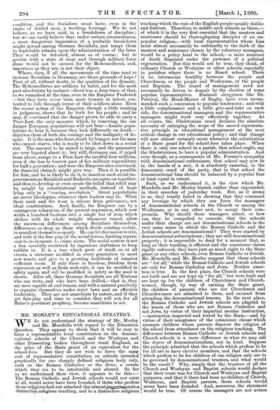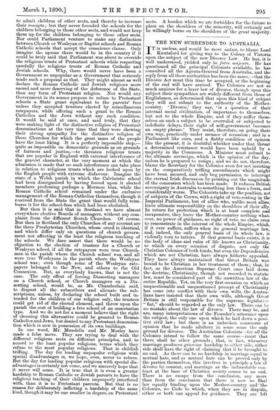'MR. MORLEY'S EDUCATIONAL STRATEGY.
WE do not understand the strategy of Mr. Morley and Mr. Mundella with regard to the Education Question. They appear to think that it will be easy to force a representative local constitution on the denomi national schools of the Church and the Wesleyan and other Dissenting bodies throughout rural England, as the price of the State grant of an equivalent for the school-fees. But they do not wish to force the same sort of representative constitution on schools. intended practically for one sharply defined religious body only, such as the Roman Catholics or the Jews, a course which they see to be intolerable and absurd. So far as we understand. their view, it appears to be this :— The Roman Catholic and Jewish schools would not exist at all, would never have been founded, if th6se _w.ho.profess those religions had not attached thg Such, as we understand it, is the view which Mr. Mundella and Mr. Morley hinted, rather than expounded, in their speeches of yesterday week. But, as it seems to us, they totally failed in showing that they command any leverage by which they can force the managers of denominational schools in the Church or among the Wesleyans, or in any other sect, to accept their com- promise. Why should these managers admit, or how can they be compelled to concede, that the schools under their charge are not denominational schools in the very same sense in which the Roman Catholic and the Jewish schools are denominational ? They were started by denominational subscriptions ; they are still denominational property; it is impossible to deny for a moment that, so long as their teaching is efficient and the conscience clause rigidly enforced, they have just as much right to the State grant as any other schools, even Roman Catholic or Jewish. Mr. Mundella and Mr. Morley suggest that these schools are "for all," while the Roman Catholic and Jewish schools are only for Roman Catholics and Jews. Neither asser- tion is true. In the first place, the Church schools were not built and are not kept up "for all," but were built and are kept up for the children of Churchmen and Church- women, though, by way of earning the State grant, the children of parents who are not Churchmen and Churchwomen are admitted to them, and excused from attending the denominational lessons. In the next place, the Roman Catholic and Jewish schools are adapted to the wants of those who are not Roman Catholics and. not Jews, by virtue of their impartial secular instruction, —instruction inspected and tested by the State,—and by virtue of their acceptance of the conscience clause which exempts children whose parents disavow the religion of the school from attendance on the religious teaching. The difference between Roman Catholic or Jewish schools and Church schools is a mere difference in what we may call the degree of denominationalism, not in kind. Suppose the principle admitted that the schools which profess to be for all are to have elective members, and that the schools which profess to be for children of one religion only are to be governed by denominational trustees, and what would be the result ? Why, simply that the trustees of all the Church and Wesleyan and Baptist schools would declare that their trust was for Church and Wesleyan and Baptist purposes, and that if there had been no children of Church, Wesleyan, and. Baptist parents, those schools would. never have been founded. And, moreover, the statement would be true. Of course the managers are not averse to admit children of other sects, and thereby to increase their receipts ; but they never founded the schools for the children belonging to those other sects, and would not keep them up for the children belonging to those other sects. Nor could Parliament venture to make any distinction between Church or Wesleyan or Baptist schools and Roman Catholic schools that accept the conscience clause. Only imagine the uproar there would be in the country if it could be truly said that Parliament was about to override the religious trusts of Protestant schools while respecting carefully the religious trusts of Roman Catholic and Jewish schools. Why, there would never have been a Government so unpopular as a Government that seriously made such a proposal as that. They might almost as well declare the Roman Catholic and Jewish religions more sacred and more deserving of the deference of the State, than any form of Protestant religion. Nor would any Government in its senses propose to refuse to Protestant schools a State grant equivalent to the parents' fees unless they accepted trustees elected by miscellaneous ratepayers, while offering such a grant to the Roman Catholics and the Jews without any such condition. It would be said at once, and said truly, that they were making light of the distinctive religion of Protestant denominations at the very time that they were showing their strong sympathy for the distinctive religion of those Churches for which the great mass of the people have the least liking. It is a perfectly impossible step,— quite as impossible on democratic grounds as on grounds of fairness and justice,—to threaten religious trusts that are popular in England. with external interference of the gravest character, at the very moment at which the admission is made that no such interference can take place in relation to religious trusts which are looked upon by the English people with extreme disfavour. Imagine the state of a Welsh parish in which the Calvinistic school had been disorganised by having forced, upon it elected members professing perhaps a Mormon bias, while the Roman Catholic school remained under the exclusive management of the Roman Catholics themselves, though it received from the State the grant that would fully reim- burse it for the school-fees which had been abolished. But then it is said that in Scotland we have almost everywhere elective Boards of managers, without any com- plaint from the different Scotch Churches. Of course. But then in Scotland the only Churches of any account are the three Presbyterian Churches, whose creed is identical, and which differ only on questions of church govern- ment not affecting in the least the religious teaching of the schools. We dare assert that there would be no Objection to the election of trustees for a Church or Wesleyan school, if all the ratepayers were true Church- men in the parish where the Church school was, and all were true Wesleyans in the parish where the Wesleyan school was ; even though some of the Wesleyan rate- payers belonged to the New, and others to the Old Connexion. But, as everybody knows, that is not the case. The only effect of forcing Dissenting managers on a Church school, or Church managers on a Dis- senting school, would be, as Mr. Chamberlain said, to disgust all the subscribers and alienate the sub- scriptions, unless, by declaring the school built and in- tended for the children of one religion only, the trustees could get rid of the elected element, and throw upon the parish the cost of building a free school of an unsectarian type. And we do not for a moment believe that the right of choosing this alternative could be granted to Roman Catholics and Jews, but denied to any Protestant denomina- tion which is now in possession of its own buildings. In one word, Mr. Mundella and Mr. Morley have made a false move. They are trying to deal with the different religious sects on different principles, and to accord to the least popular religions, terms which they refuse to the most popular religions. That is childish trifling. The day for loading unpopular religions with special disadvantages is, we hope, over, never to return. But the day for loading popular religions with special clis- advantagesis certainly not come, and we sincerely hope that it never will come. It is true that it is even a greater hardship to Roman Catholic or Jewish parents to have the religious teaching of their children improperly interfered with, than it is to Protestant parents. But that is no reason for deliberately inflicting a hardship of the same kind, though it may be one smaller in degree, on Protestant sects. A burden which we are forbidden for the future to place on the shoulders of the minority, will certainly not be willingly borne on the shoulders of the great majority.







































 Previous page
Previous page